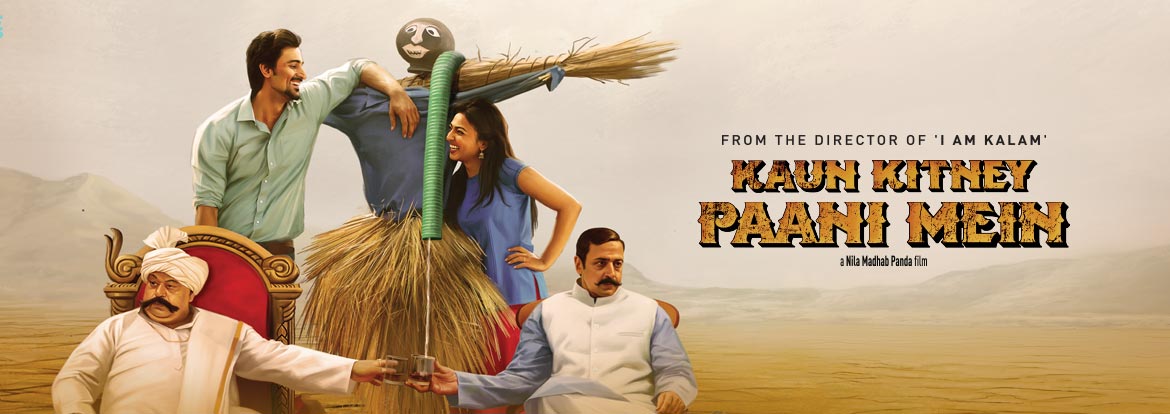By Rahul Desai
Kaun Kitney Paani Mein is a wry, dry and extremely cultured take on the age-old Indian cinema staple of rival villages, class wars, young star-crossed lovers and politics. That it maintains a satirical tone is down to the packaging it chooses – one of withered regality and historical reverb, a State (Odisha) caught between the trials of traditionalism and the shackles of modernity.
Director Nila Madhab Panda (I Am Kalam) constructs a world that would be funny if not for its real-life relevance. Upri is a drought-hit village that has gone from royal riches to rags. “Kshatriya’s job is to go to war. But there are no forts left to conquer, so one must find other battles…” sighs Upri’s overweight, hapless and completely broke King (Saurabh Shukla). Much of the film concentrates on him whiling away time at his in-house bar, or being fanned in the verandah by his loyal servant. Shukla’s body language tells a story of its own; here’s an actor who makes even the most rehearsed actions seem like he’s winging it.
His land is so barren that auctions are useless, and he must make do with only soda in his whiskey (or vice versa, given his appearance). While the neighbouring Bairi village – run by a retired wrestler (Gulshan Grover) and his agriculture-student daughter (Radhika Apte; she’s everywhere) – is prospering because of the skills they learned as slaves under arrogant Upri Kings, the direness of Upri’s condition is reflected in the pitiful daily routines of its decrepit King. Desperate villagers, from harlots to Pandits, use packets of water as currency.
Panda is cheeky in this setup. He varies colour tones, textures and energies to define separate environments. There’s an undeniable rural-ness to his atmosphere, one that is only occasionally (and rightfully) punctured by the presence of Kunal Kapoor (as Raja’s city-dweller son and greatest disappointment) and Miss Apte. They look like the only planted elements in Panda’s hinterland interpretation; this isn’t unusual in reel dramas, for it’s most likely their education that defines their dialect. But their progress is stilted, and they go directly from awkward to intimate, because what is a love story without a song? Their moments provide a brief, if not entirely necessary break from a very watchable bunch of characters from both sides: A silver-tongued pandit uses his water to grow cannabis behind his temple, a clueless Sarpanch sucks up to the clueless King, a Janhit party leader decides to exploit the animosity between both villages, and a mysterious parallel track – characterized by ill-timed inserts – of a tailor who continues to dig for water in his yard.
Obviously, with the arrival of Kapoor, a scheme is quickly concocted and the responsibility of resuscitation is put on his very metropolitan shoulders. Once this scheme takes flight, Panda attempts to touch upon various themes. More often than not, he bites off just as much as he can chew. He explores the implications of a two-decade long blood feud – and not the way ‘Josh’ did, through gang wars between the Eagles and ‘Bichchoos’ – as well as the intriguing love-hate relationship between royalty and politicians. To an extent, he also suggests through a rather haphazardly staged climax – now an unfortunate trademark of Indian satires – that perhaps the only way to kill silly superstitions and blind faith is through more silly superstitions and blind faith.
The morality here is murky at best, but serves a purpose if it results in any kind of evolution – or acceptance of inter-caste love, or even the sheer horror of watching water finally dilute a glass of fine scotch. Better than soda, I suppose.
This film does succeed in making us thirsty – for water, and for more work from Nila Madhab Panda. It also makes us forget that he was responsible for the preposterous ‘Babloo Happy Hai’, his yearlong moment of temporary insanity.







Leave A Comment
You must be logged in to post a comment.